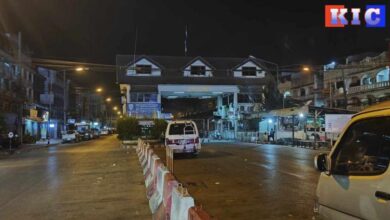No place to call home…

After 60 years of military rule, Burma has become one of the least developed countries in the world. Military rule has denied civilians their basic human rights. Militarisation by the Burma Army (Tamadaw) in ethnic areas such as Karen, Shan and Kachin States continues to cause severe humanitarian problems in Burma. Forced displacement, forced relocation, forced labor, extortion, are all used by the Burma Army in order to continue their fight against the ethnic armies. It is estimated that at least two million Burmese people can’t afford to live in their own country and are now economic refugees in Thailand. This is the story of one of these economic refugees, Pati K’loke, who left his home 12-years-ago to live and work in Thailand. He is from the Karen State, Burma.
“To be honest I don’t have a home. In the past I have lived in a hut and had no house. To be honest, I came to Thailand just for the job. It does not mean that there are no jobs in Burma. There are jobs to do in Burma. I could earn 2,000 kyats for a days work but I would have to spend all of that on food. Working in Thailand for one day is enough for three days food in Burma.
My family…
“I have three members in my family. I have one daughter and she is studying in Burma. I came to work here for my daughter’s future. I love my daughter very much. I visit home, but dare not stay longer than three or four days. When I visit home I have to pay 500kyat at Burma Army checkpoints. With a national identity card or without one I have to pay the same.”
Living and working in Thailand…
“In the past I used a vender cart to collect old stuff to sell. Now I’m getting old and I’m no longer able to push the cart, so I decided to buy a very old motorbike. In my work I’m have difficulties with the Thai police. When the police come I have to run away from them. I have to watch the situation of the police. I have to work on one side and watch out for the police on the other side. If they see me they will stop and question me. If I ride the good motorbike they will question me if it’s a stolen motorbike. If the old motorbike breaks down I cannot work.
“I worked at the rice mill for six years, but I got fed up with this work. I had to wake up before dawn and clean up the pig dung. When sunlight came I had to go to the paddy field to collect paddies and then come back to mill the rice the whole day. I even had to eat my meal in the rice mill.”
Living in Thailand…
“I have to rent a place to live. I cannot buy the land or house, as I have no legal documents. There are different prices for renting. It starts from 50 baht a month and goes up to a 100 to 200 a month. I have found a place to live for free – I only have to take care of the garden, grow plants and look after them. I’m happy to live here taking care of the plants and the garden. The owner doesn’t need to do anything. I take care of it and grow everything.”
There are an estimated 140,00 refugees living in camps along the Thai Burma border.
My Health…
“If I get sick, I can go to Mae Tao Clinic in Mae Sot. We can get medical treatment there. Mae Toa Clinic gives many Burmese healthcare they could never get back in Burma.”
It is estimated by international medical organisations that in Eastern Burma the infant mortality rate is 91 deaths for every 1000, compared to an average rate of 76 for the rest of Burma (and only 18 in neighboring Thailand). According to UNICEF in its 2011 State of the World’s Children report, Burma has the 44th highest infant mortality rate out of the 193 countries listed. The country’s last budget plan allocated a quarter of its funds to the military – with just 1.37% for healthcare.
Labor organisations estimate that as many as two million Burmese people, like Pati K’loke, have left Burma to find a better job and a better life in Thailand. They left their country, their land, their homes, their families and the ones they love the most. They are working in factories, as domestic workers, and in agriculture.




